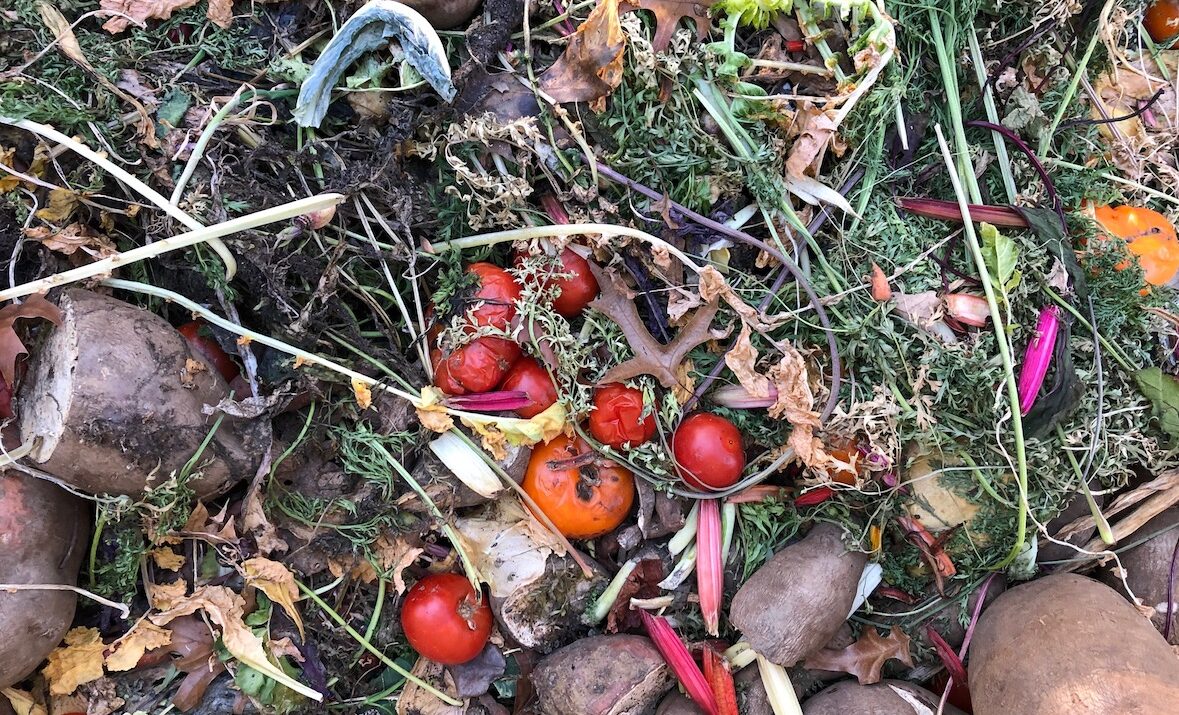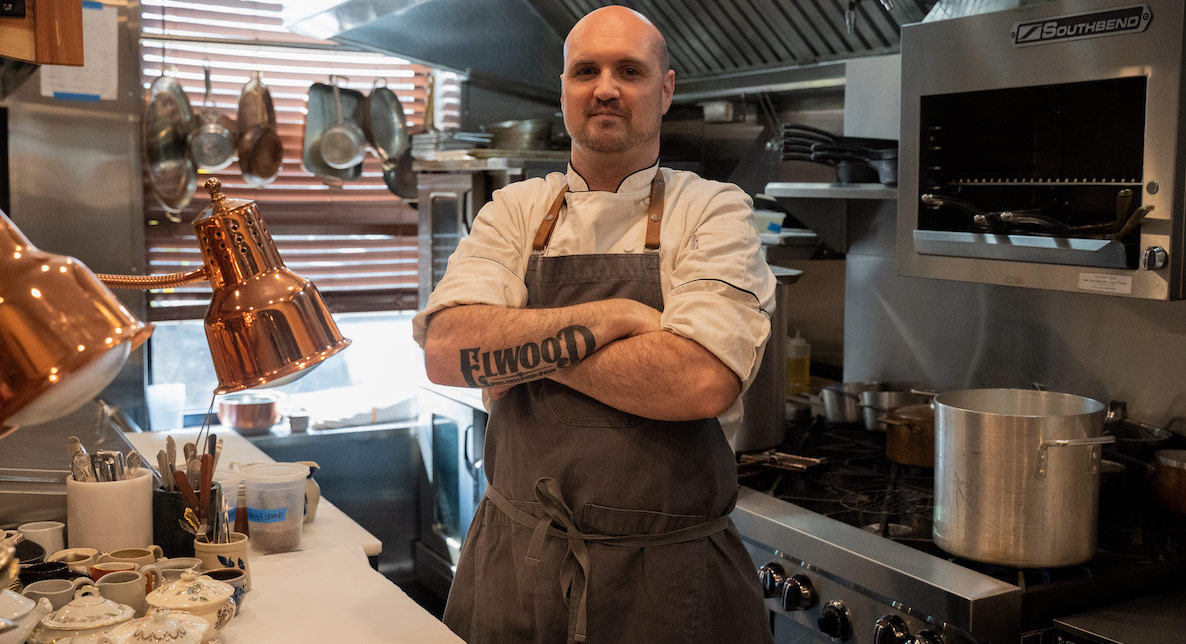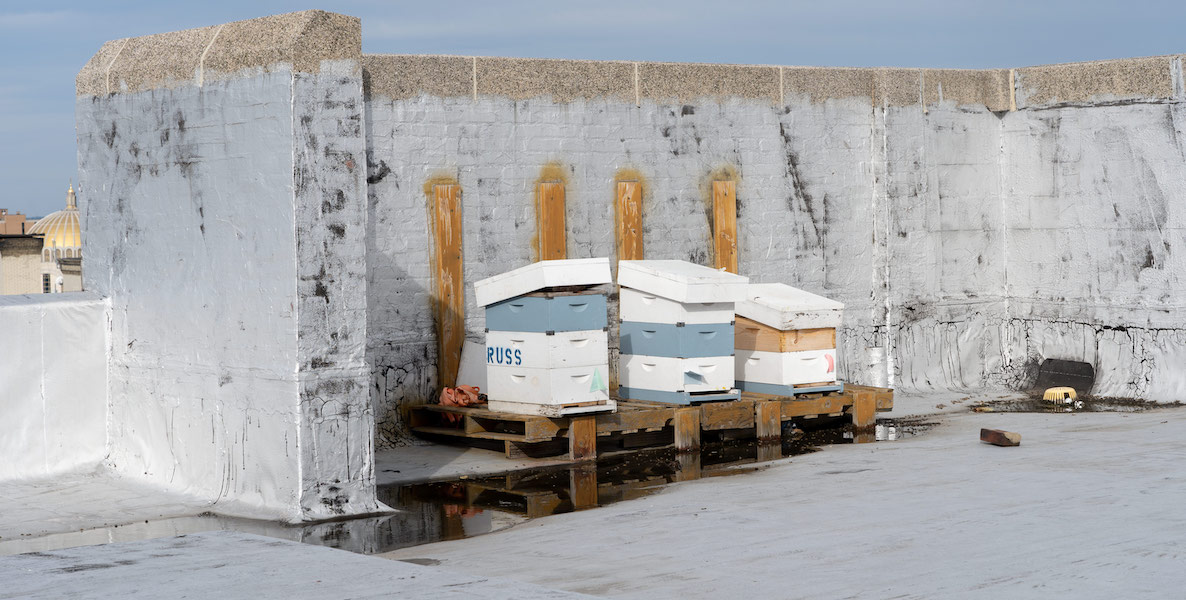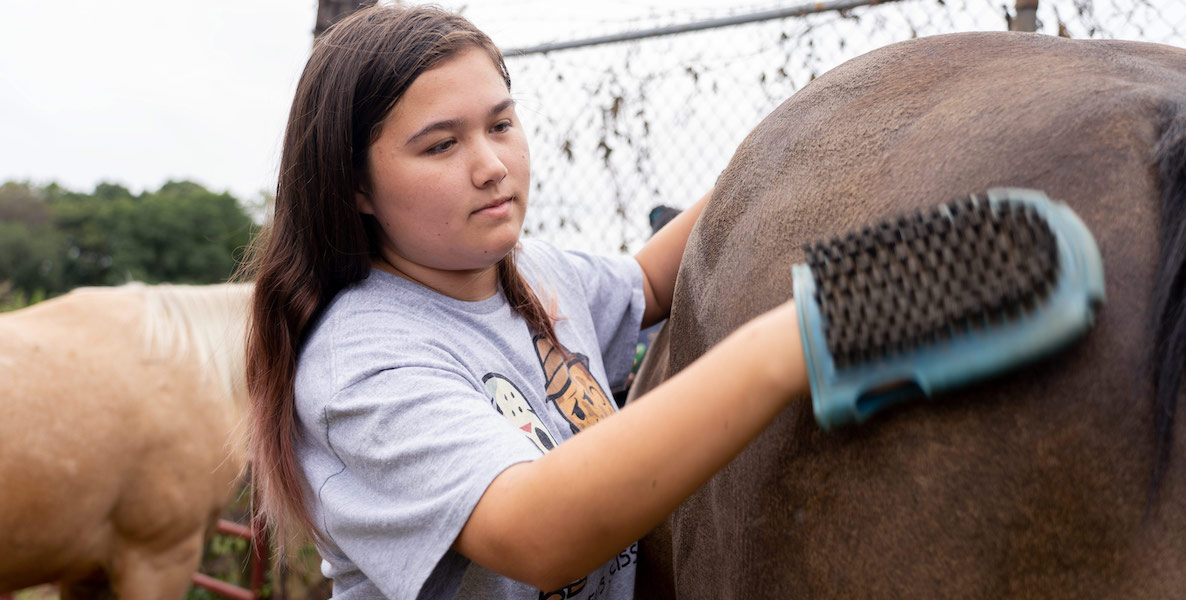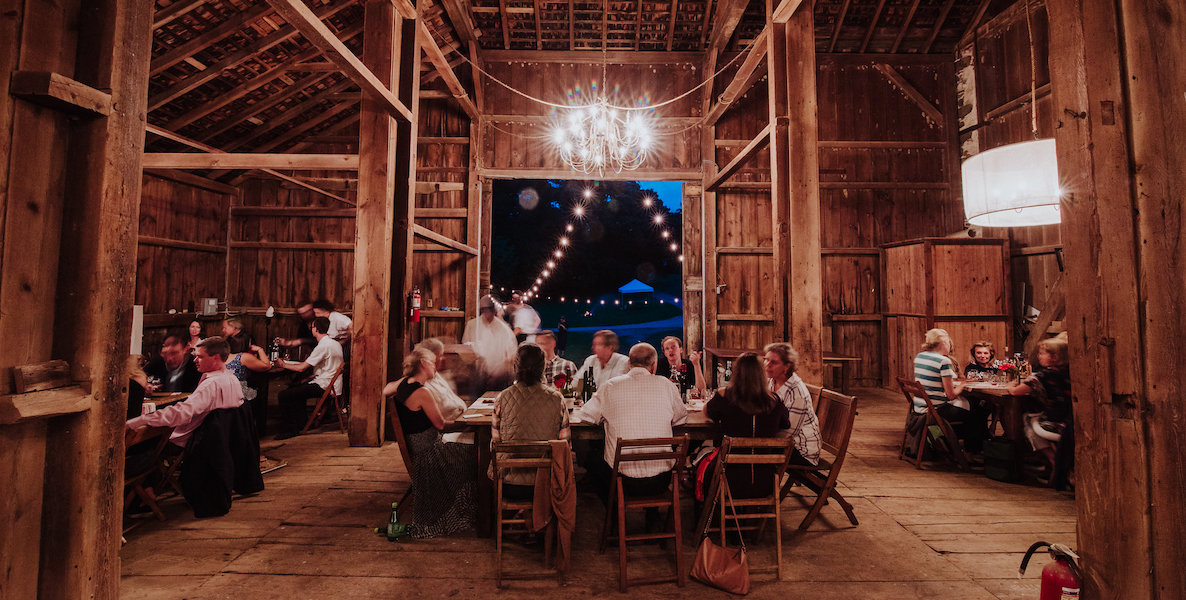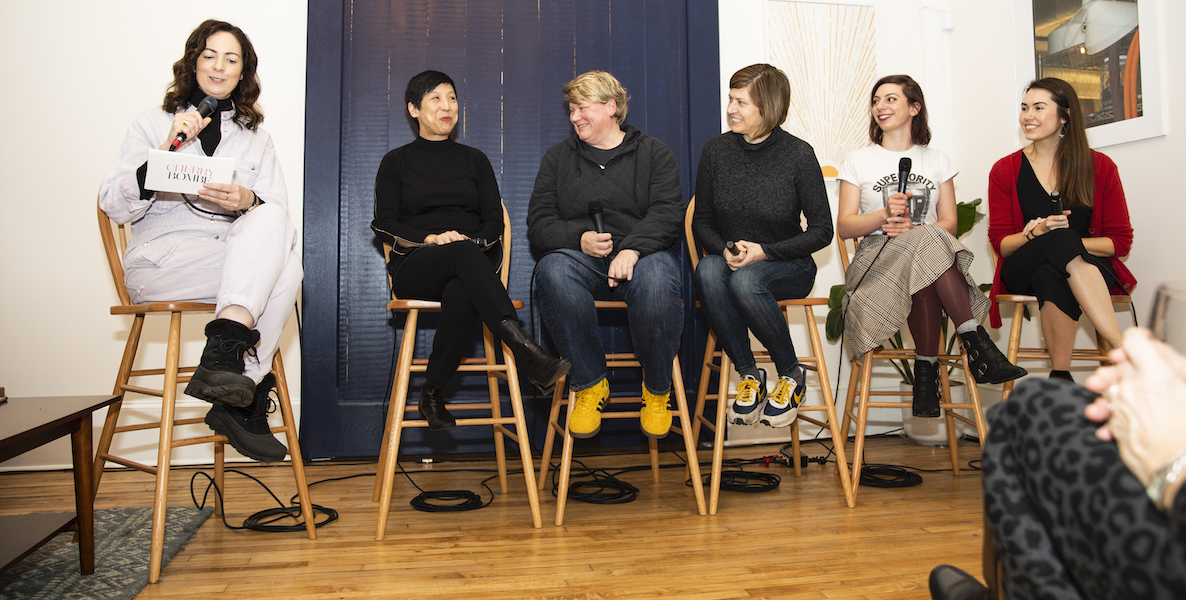It was a special night, when it seemed like the most important thing in the world of food was happening in Philadelphia. The occasion, on the first cold Monday night of December, was the last stop of Radio Cherry Bombe’s “Food For Thought” tour at Triple Bottom Brewing, to celebrate local women entrepreneurs in the food industry.
![]() Cherry Bombe, the women-focused indie magazine founded in 2013 by Kerry Diamond and Claudia Wu, has been hugely influential as popular food culture and food media gets over its bro-y-ness. Over the past half-decade, the print magazine has added podcasts and events like its annual Jubilee conference in New York, and this one. Diamond hosted the live recording at Triple Bottom, with a crowd of industry people and several dozen fans—who Cherry Bombe calls “the Bombesquad”—and started with shoutouts to Cristina Martinez’s Barbacoa and Tova du Plessis’ Essen, where she’d eaten earlier in the day.
Cherry Bombe, the women-focused indie magazine founded in 2013 by Kerry Diamond and Claudia Wu, has been hugely influential as popular food culture and food media gets over its bro-y-ness. Over the past half-decade, the print magazine has added podcasts and events like its annual Jubilee conference in New York, and this one. Diamond hosted the live recording at Triple Bottom, with a crowd of industry people and several dozen fans—who Cherry Bombe calls “the Bombesquad”—and started with shoutouts to Cristina Martinez’s Barbacoa and Tova du Plessis’ Essen, where she’d eaten earlier in the day.

They were just two of the several women-owned food companies present or mentioned during the night that have been critical to transforming the city’s food culture over the last several years, and there could have been more: whether it’s Heather Marold Thomason’s butchery at Primal Supply Meats, Jillian Encarnacion and Resa Mueller’s exciting take on Filipino cuisine at Lalo, or Ange Branca’s wildly popular Saté Kampar and charitable Muhibbah dinner series. Philly has long been ahead of the curve when it comes to female food pioneers, from Judy Wicks at White Dog Cafe to Susanna Foo to Audrey Claire Taichman’s pioneering eponymous BYOB.
Radio Cherry Bombe’s evening program was a little all over the map. But it worked, likely because, in Philadelphia, women are leading so many different facets of food. Things began with tea expert Alexis Siemons, who consults on brands and menus, and teaches classes on tea. Siemons only spoke a few words on tea (for matcha at home: “use a bamboo whisk and it will create a beautiful frothy texture”; consider using tea to rehydrate dried mushrooms and fruit).
Mostly, she read an essay about her father’s “pre-eating” rituals of scanning ![]() restaurant menus before a memorable family trip to Italy, something that inspired her journey into food and the idea that “maybe there’s a way to strike a balance, where we can be informed and still leave a little room for childlike surprise.” “Do you remember your first momentous meal?” Siemons asked. “Carry that remarkable sense of discovery with you and your heart will always be full.”
restaurant menus before a memorable family trip to Italy, something that inspired her journey into food and the idea that “maybe there’s a way to strike a balance, where we can be informed and still leave a little room for childlike surprise.” “Do you remember your first momentous meal?” Siemons asked. “Carry that remarkable sense of discovery with you and your heart will always be full.”
Next, Jill Weber, owner of Sojourn Philly restaurant group (including Jet Wine Bar and Rex 1516) told a story about how her work as a professional archaeologist in countries like Turkey, Syria, Armenia, and Iraq evolved into becoming a restaurateur (“embrace the chaos” being key to both).
Weber described her first excavation in Turkey as a 21-year-old, experiencing the bustling bazaar with “sesame rolls, mussels, dried apricot, rose petals, tamarind, tea, juice, coffee, everything you can imagine, everybody yelling.” At every stop in her journey, there was sharing and inclusion through food. “In every culture I’ve ever been in, I’ve been brought into the fold by women bringing me food,” she said. Pots of tea, eat pistachios, olives and bread in Turkey, meat patties in Kurdistan, huge plates of rice with almonds and raisins and roasted lambs and lamb brains in Syria.
She acknowledged her role as a privileged outsider in cultures that are stifling conservative toward women. In Syria, Weber said, “I was never excluded from male-dominated public life, and always invited into female-dominated private life, when the men absolutely were not.”
Years in these places inspired her to bring back the wines and spirits of places like Lebanon, Turkey and the Republic of Georgia to Philadelphia, creating connections between us and the rest of the world.
“A restaurant is a community place,” Fork’s Yin said. “A restaurant is a place to restore.”
The big names at Triple Bottom Brewery that night were Ellen Yin, owner of High Street Hospitality Group, including Fork, and Marcie Turney and Valerie Safran, whose Midtown Village restaurant empire will soon include seven spots. But they were paired on the Cherry Bombe panel with two relative newcomers, Justine Macneil, who recently opened Fiore, an Italian all-day café and restaurant in Queen Village with her husband Ed Crochet this year, and Tess Hart, the co-founder of Triple Bottom Brewery.
![]() Turney and Safran talked about the struggles of opening their latest and most-ambitious restaurant, Loveluck, in the former Love Park Welcome Center. They also talked about the challenges of maturing beyond the day-to-day grind and into more of a management role, and also the challenges of running a restaurant now as parents. Yin talked about the need for a restaurateur to be “resolute” or have “stubbornness.”
Turney and Safran talked about the struggles of opening their latest and most-ambitious restaurant, Loveluck, in the former Love Park Welcome Center. They also talked about the challenges of maturing beyond the day-to-day grind and into more of a management role, and also the challenges of running a restaurant now as parents. Yin talked about the need for a restaurateur to be “resolute” or have “stubbornness.”
“You don’t have any choice,” she said. “I just keep pushing and plugging along.”
But it was the two younger business owners who really talked most about changing the food culture. Diamond asked Macneil, who worked as a pastry chef in New York at places like Mario Batali’s Del Posto, what it was like to work in a male-dominated kitchen culture. Macneil, however, said that pastry departments, even at male-dominated restaurants, were predominantly female. Later, as we tasted desserts from Cake Life, Lil’ Pop Shop, Weckerly’s, Fiore, and Barbuzzo, it underscored how pastry has often been a key entry point for women into the food industry.

“Everything on my mind is ‘How do I create a healthy kitchen culture,’” said Macneil. “We try our hardest to hire nice people.” She said she could teach someone how to bake, but, “I cannot teach being kind to each other or respectful of each other.”
Hart spoke even more broadly, saying she and husband Bill Popwell had opened ![]() Triple Bottom Brewery this past summer as a “space of community.” She reminded the audience that Philadelphia has the highest poverty rate of any big city in the U.S., while at the same time has the fastest-growing millennial population of any U.S. city. Diamond asked Hart about Triple Bottom’s stated fair-chance mission. “Some of our team members have experienced homelessness, some have experienced the justice system. And all of them, no matter what their experience is, get a chance to grow here,” Hart said. “We’re very intentional in creating a space where all of them can grow and thrive.”
Triple Bottom Brewery this past summer as a “space of community.” She reminded the audience that Philadelphia has the highest poverty rate of any big city in the U.S., while at the same time has the fastest-growing millennial population of any U.S. city. Diamond asked Hart about Triple Bottom’s stated fair-chance mission. “Some of our team members have experienced homelessness, some have experienced the justice system. And all of them, no matter what their experience is, get a chance to grow here,” Hart said. “We’re very intentional in creating a space where all of them can grow and thrive.”
The Bombesquad, Diamond told us, were “women who get shit done.” She added: “And a few men that get shit done.”
Perhaps the most gracious moment of the evening happened next, when Yin, the seasoned veteran, told Hart, whose business opened three months ago: “Tess, what you’re doing is amazing. I’m looking for people with initiative, whether they’ve been in prison, whether they’ve been homeless. I agree with you. They should be given a fair chance.”
“A restaurant is a community place,” Yin added. “A restaurant is a place to restore.”
This sense of community and mentorship, in the end, is crucial to all industries. But the Cherry Bombe gathering underscored how essential it is in food. When the program was over, Diamond implored people to network, to make a new contact. The Bombesquad, she told us, were “women who get shit done.” She added: “And a few men that get shit done.”
Jason Wilson is The Citizen’s 2019 Jeremy Nowak Fellow, funded by Spring Point Partners, in honor of our late chairman Jeremy Nowak. He is the author of three books, including the recent The Cider Revival, series editor of The Best American Travel Writing, and writes for the Washington Post, New York Times, New Yorker and many other publications. You can find him at jasonwilson.com.
Want more Philly food news? Check out these related articles:
- Triple Bottom Brewing proves that business can be a source for good
- How Philly invented ice cream (as we know it)
- The fascinating roots of pepper pot soup in Philly (and how to make it)



